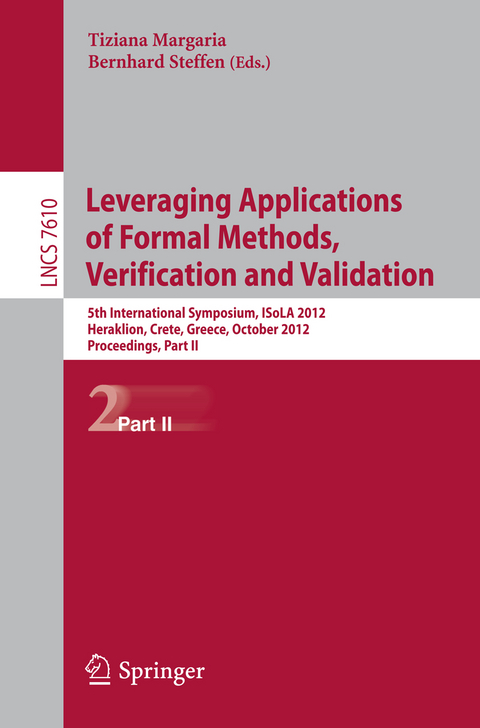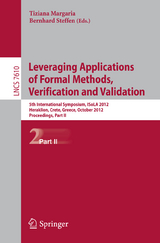Leveraging Applications of Formal Methods, Verification and Validation
Springer Berlin (Verlag)
978-3-642-34031-4 (ISBN)
The two volumes contain papers presented in the topical sections on adaptable and evolving software for eternal systems, approaches for mastering change, runtime verification: the application perspective, model-based testing and model inference, learning techniques for software verification and validation, LearnLib tutorial: from finite automata to register interface programs, RERS grey-box challenge 2012, Linux driver verification, bioscientific data processing and modeling, process and data integration in the networked healthcare, timing constraints: theory meets practice, formal methods for the developent and certification of X-by-wire control systems, quantitative modelling and analysis, software aspects of robotic systems, process-oriented geoinformation systems and applications, handling heterogeneity in formal development of HW and SW Systems.
Bernhard Steffen studierte Mathematik an der Christian-Albrechts Universität zu Kiel, wo er anschließend auch in der Informatik promovierte. Nach Forschungsaufenthalten am Laboratory for Foundations in Computer Science in Edinburgh und an der Universität Aarhus, wurde er 1990 an die RWTH Aachen berufen, von wo er 1993 an die Universität Passau auf den Lehrstuhl für Programmiersysteme wechselte. Seit 1997 leitet er den Lehrstuhl für Programmiersysteme und Compilerbau an der TU-Dortmund. Bernhard Steffen ist Gründer der internationalen Konferenz über Tools and Algorithm for the Conbstruction and Analysis of Systems (TACAS) und des internationalen Journals über Software Tools for Technology Transfer (STTT).
Linux Driver Verification (Position Paper).- Bioscientific Data Processing and Modeling.- Using Multiobjective Optimization and Energy Minimization to Design an Isoform-Selective Ligand of the 14-3-3 Protein.- Segmentation for High-Throughput Image Analysis: Watershed Masked Clustering.- Efficient and Robust Shape Retrieval from Deformable Templates.- OWL-DL Domain-Models as Abstract Workflows.- Processes and Data Integration in the Networked Healthcare.- Simple Modeling of Executable Role-Based Workflows: An Application in the Healthcare Domain.- Considerations for Healthcare Applications in a Platform as a Service Environment.- Reha-Sports: The Challenge of Small Margin Healthcare Accounting.- Timing Constraints: Theory Meets Practice.- A Simple and Flexible Timing Constraint Logic.- Generalized Weakly-Hard Constraints.- Modeling a BSG-E Automotive System with the Timing Augmented Description Language.- Formal Analysis of TESLA Protocol in the Timed OTS/CafeOBJ Method.- Formal Specification and Verification of Task Time Constraints for Real-Time Systems.- The WCET Analysis Tool CalcWcet167.- Abstract Execution for Event-Driven Systems - An Application from Automotive/Infotainment Development.- Formal Methods for Intelligent Transportation Systems.- Model-Driven V&V Processes for Computer Based Control Systems: A Unifying Perspective.- Formal Methods in Avionic Software Certification: The DO-178C Perspective.- Product Line Engineering Applied to CBTC Systems Development.- Improving Verification Process in Driverless Metro Systems: The MBAT Project.- Optimising Ordering Strategies for Symbolic Model Checking of Railway Interlockings.- Automated Generation of Safety Requirements from Railway Interlocking Tables.- Distributing the Challenge of Model Checking Interlocking Control Tables.- Quantitative Modelling and Analysis.- Schedulability of Herschel-Planck Revisited Using Statistical Model Checking.- Checking Correctness of Services Modeled as Priced Timed Automata.- Software Aspects of Robotic Systems.- Process-Oriented Geoinformation Systems and Applications.- Concepts and Techniques of an Online 3D Atlas - Challenges in Cartographic 3D Geovisualization.- Handling Heterogeneity in Formal Developments of Hardware and Software Systems.- Formal Verification Tools for DSML Users: A Process Modeling Case Study.- An Ontological Pivot Model to Interoperate Heterogeneous User Requirements.
Bioscientific Data Processing and Modeling.- Using Multiobjective Optimization and Energy Minimization to Design an Isoform-Selective Ligand of the 14-3-3 Protein.- Segmentation for High-Throughput Image Analysis: Watershed Masked Clustering.- Efficient and Robust Shape Retrieval from Deformable Templates.- OWL-DL Domain-Models as Abstract Workflows.- Processes and Data Integration in the Networked Healthcare.- Simple Modeling of Executable Role-Based Workflows: An Application in the Healthcare Domain.- Considerations for Healthcare Applications in a Platform as a Service Environment.- Reha-Sports: The Challenge of Small Margin Healthcare Accounting.- Timing Constraints: Theory Meets Practice.- A Simple and Flexible Timing Constraint Logic.- Generalized Weakly-Hard Constraints.- Modeling a BSG-E Automotive System with the Timing Augmented Description Language.- Formal Analysis of TESLA Protocol in the Timed OTS/CafeOBJ Method.- Formal Specification and Verification of Task Time Constraints for Real-Time Systems.- The WCET Analysis Tool CalcWcet167.- Abstract Execution for Event-Driven Systems - An Application from Automotive/Infotainment Development.- Formal Methods for Intelligent Transportation Systems.- Model-Driven V&V Processes for Computer Based Control Systems: A Unifying Perspective.- Formal Methods in Avionic Software Certification: The DO-178C Perspective.- Product Line Engineering Applied to CBTC Systems Development.- Improving Verification Process in Driverless Metro Systems: The MBAT Project.- Optimising Ordering Strategies forSymbolic Model Checking of Railway Interlockings.- Automated Generation of Safety Requirements from Railway Interlocking Tables.- Distributing the Challenge of Model Checking Interlocking Control Tables.- Quantitative Modelling and Analysis.- Schedulability of Herschel-Planck Revisited Using Statistical Model Checking.- Checking Correctness of Services Modeled as Priced Timed Automata.- Software Aspects of Robotic Systems.- Process-Oriented Geoinformation Systems and Applications.- Concepts and Techniques of an Online 3D Atlas - Challenges in Cartographic 3D Geovisualization.- Handling Heterogeneity in Formal Developments of Hardware and Software Systems.- Formal Verification Tools for DSML Users: A Process Modeling Case Study.- An Ontological Pivot Model to Interoperate Heterogeneous User Requirements.| Erscheint lt. Verlag | 11.9.2012 |
|---|---|
| Reihe/Serie | Lecture Notes in Computer Science | Theoretical Computer Science and General Issues |
| Zusatzinfo | XVI, 361 p. 129 illus. |
| Verlagsort | Berlin |
| Sprache | englisch |
| Maße | 155 x 235 mm |
| Gewicht | 573 g |
| Themenwelt | Mathematik / Informatik ► Informatik ► Betriebssysteme / Server |
| Mathematik / Informatik ► Informatik ► Programmiersprachen / -werkzeuge | |
| Informatik ► Software Entwicklung ► User Interfaces (HCI) | |
| Informatik ► Theorie / Studium ► Künstliche Intelligenz / Robotik | |
| Schlagworte | Automata • concurrent programs • Model Checking • scientific workflows • Software Product Lines |
| ISBN-10 | 3-642-34031-8 / 3642340318 |
| ISBN-13 | 978-3-642-34031-4 / 9783642340314 |
| Zustand | Neuware |
| Haben Sie eine Frage zum Produkt? |
aus dem Bereich





